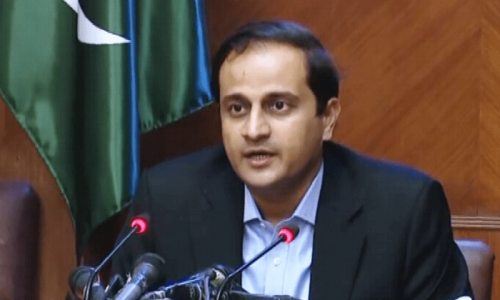HYDERABAD: Elderly Sonu Meghwar is adamant to sell his handmade embroidered Thari quilt, a masterpiece his wife took 10 years to complete, for Rs2.5 million and says he has received an offer of Rs1.6m lately but he will either sell it for Rs2.5m or wait till the right buyer comes.
Meghwar, who hails from a village in Islamkot taluka, set up his stall in two-day Thar Festival that ran from Friday to Saturday at Sindh Museum. The Sindh Indigenous & Traditional Crafts Company (SITCO) had organised the festival in collaboration with Besant Hall Cultural Centre of Endowment Fund Trust (EFT).
This piece of art can be used as a bed sheet. “It took my wife, Nenu, 10 long years to finish. She started the highly delicate work in 1976 and completed it in 1985,” said Sonu. He said the quilt was made from silk thread, which he had bought from an acquaintance in 70s. Its price in India at that time was Rs2,200 a tola which came to Rs6,500 per tola in Pakistan. He had bought 3kg silk for Rs120,000 of which 2.5kg was used in the quilt.
“When I bought the silk it used to have 12 grams but now a tola has 10 grams,” he said.
“When I first put it on display at an exhibition in Quaid-i-Azam’s mausoleum in 2017, a Memon connoisseur from Shikarpur had offered me Rs1m but I didn’t agree. Again, a man from Khoso community of Nagarparkar raised the offer to Rs1.6m but I didn’t accept,” he said.
He described the quilt’s work as ‘kharak barq’ in local parlance and insisted he would either sell it for Rs2.5m or wait till the right customer arrived.
“It is a piece of art,” said Shakeel Abro, a representative of Sitco. “Pure silk is produced in India. It’s a laborious and delicate work to handle silk thread in this work. That’s why cost variation has significantly changed over last couple of decades. And this is the only piece he has to offer,” said Abro.
EFT secretary Hamid Akhund said that Sonu’s quilt had Islamic motif that consisted in geometric patterns and mirror work. It was different from non-Muslim motif that always comprised live figures like birds etc, he said.
“Thar Festival aims to promote and project artisans, their work, tradition and musician. Women’s shoes made from cow’s hide were also on display and women were showing keen interest in it, he said.
He said that 120 Thari artisans were brought to this festival. A mock Thari wedding was also staged at the event. Thari singers and musicians performed in the lawns. Besides, Thari cuisine and handmade women’s garments including lungi, khes, dye work of chunri and para (frock or ghagra) were also on display.
“Chunri and para work is losing popularity,” said Gawri Shankar from Pithoro taluka of Umerkot district. “Young generation is no more interested in it. The trend has declined by 50pc now. It is now worn on special occasions,” he said. He explained that a 2.5ft x 2.5ft cost of chunri came to around Rs3,400 while para (a kind of frock) was Rs5,500. “We have to sell a frock for Rs7,000,” Shankar said.
Shankar said that families like Rajar, Mangrio, Nohri, Samejo and Mahars still made this costume part of a bride’s dowry. “They used to present 21 or 41 pieces of chunri and frock in dowry which has now dropped to two or less,” he said and added use of thread in both the items was quite laborious and this job was done by women domestically. “Each frock or chunri takes 20 days before it is ready and dyed on a piece of cotton,” he informed.
Shankar said that now only women in the age bracket of 50-60 years continue to wear it. Besides him, he said, two other fellows in Ghulam Shah village, Pithoro taluka, produced this work.
Published in Dawn, December 1st, 2024












































Dear visitor, the comments section is undergoing an overhaul and will return soon.